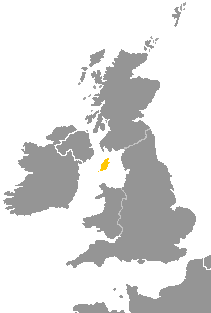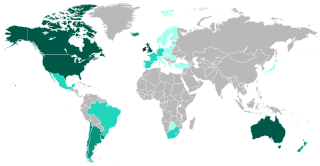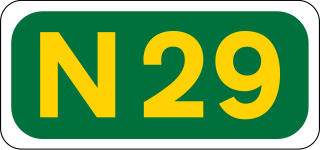
Ireland, also known as the Republic of Ireland, is a country in north-western Europe consisting of 26 of the 32 counties of the island of Ireland. The capital and largest city is Dublin, on the eastern side of the island. Around 40% of the country's population of 5 million people resides in the Greater Dublin Area. The sovereign state shares its only land border with Northern Ireland, which is part of the United Kingdom. It is otherwise surrounded by the Atlantic Ocean, with the Celtic Sea to the south, St George's Channel to the south-east, and the Irish Sea to the east. It is a unitary, parliamentary republic. The legislature, the Oireachtas, consists of a lower house, Dáil Éireann, an upper house, Seanad Éireann, and an elected President who serves as the largely ceremonial head of state, but with some important powers and duties. The head of government is the Taoiseach, who is elected by the Dáil and appointed by the President; the Taoiseach in turn appoints other government ministers.

Manx, also known as Manx Gaelic or Manks, is a Goidelic language of the insular Celtic branch of the Celtic language family, itself a branch of the Indo-European language family. Manx is the historical language of the Manx people.

Northern Ireland is a part of the United Kingdom that is variously described as a country, province, territory or region. Located in the northeast of the island of Ireland, Northern Ireland shares a border to the south and west with the Republic of Ireland. In 2011, its population was 1,810,863, constituting about 30% of the island's population and about 3% of the UK's population. The Northern Ireland Assembly, established by the Northern Ireland Act 1998, holds responsibility for a range of devolved policy matters, while other areas are reserved for the UK Government. Northern Ireland co-operates with the Republic of Ireland in several areas.

Ireland is an island in the North Atlantic Ocean, in north-western Europe. It is separated from Great Britain to its east by the North Channel, the Irish Sea, and St George's Channel. Ireland is the second-largest island of the British Isles, the third-largest in Europe, and the twentieth-largest on Earth.

The Irish are an ethnic group and nation native to the island of Ireland, who share a common history and culture. There have been humans in Ireland for about 33,000 years, and it has been continually inhabited for more than 10,000 years. For most of Ireland's recorded history, the Irish have been primarily a Gaelic people. From the 9th century, small numbers of Vikings settled in Ireland, becoming the Norse-Gaels. Anglo-Normans conquered parts of Ireland in the 12th century, while England's 16th/17th-century conquest and colonisation of Ireland brought many English and Lowland Scots to parts of the island, especially the north. Today, Ireland is made up of the Republic of Ireland and Northern Ireland. The people of Northern Ireland hold various national identities including British, Irish, Northern Irish or some combination thereof.

BBC Two Northern Ireland is the Northern Irish variation of BBC Two operated by BBC Northern Ireland. It is broadcast via digital terrestrial transmitters and from the SES Astra 2E satellite at the 28.2° East orbital position.

The N29 road is a national primary road in Ireland. It connects the Port of Waterford at Belview, County Kilkenny to Waterford City via the N25. The road and port are located on the north bank of the River Suir.

The United Provinces of Armagh and Tuam, commonly called the Province of Armagh, and also known as the Northern Province, is one of the two ecclesiastical provinces that together form the Anglican Church of Ireland; the other is the Province of Dublin. The province has existed since 1833, when the ancient Province of Armagh was merged with the Province of Tuam. The Archbishop of Armagh is its metropolitan bishop.
Bardic poetry is the writings produced by a class of poets trained in the bardic schools of Ireland and the Gaelic parts of Scotland, as they existed down to about the middle of the 17th century or, in Scotland, the early 18th century. Most of the texts preserved are in Middle Irish or in early Modern Irish, however, even though the manuscripts were very plentiful, very few have been published. It is considered a period of great literary stability due to the formalised literary language that changed very little.

Members of the Legislative Assembly are representatives elected by the voters to the Northern Ireland Assembly.

The Northern Ireland Assembly was a legislative assembly set up by the Government of the United Kingdom on 3 May 1973 to restore devolved government to Northern Ireland with the power-sharing Northern Ireland Executive made up of unionists and nationalists. It was abolished by the Northern Ireland Act 1974.

Irish, also known as Gaelic, is a Goidelic language of the Insular Celtic branch of the Celtic language family, which is a part of the Indo-European language family. Irish is indigenous to the island of Ireland and was the population's first language until the 19th century, when English gradually became dominant, particularly in the last decades of the century. Irish is still spoken as a first language in a small number of areas of certain counties such as Cork, Donegal, Galway, and Kerry, as well as smaller areas of counties Mayo, Meath, and Waterford. It is also spoken by a larger group of habitual but non-traditional speakers, mostly in urban areas where the majority are second-language speakers. Daily users in the Republic of Ireland outside the education system number around 73,000 (1.5%), and the total number of persons who claimed they could speak Irish in April 2016 was 1,761,420, representing 39.8% of respondents.
Mondine Garcia was a French guitarist from Paris who specialized in gypsy jazz.
Jules Ninine was a politician from Guadeloupe who served and represented Cameroon in the French National Assembly from 1946-1958.
Tangga is an Oceanic language of New Ireland, spoken on Tanga and Feni islands and in Sena, Muliama and Varangansau villages in the Tanglamet area of Namatanai of New Ireland itself. These three locations are highly divergent; children from one understand little to nothing of the others, and adults consider them to be distinct languages, though they recognize their common history of their migration from Tanga and Feni to New Ireland.

The R286 road is a regional road in Ireland. It is largely a loop road from the N16 linking Sligo and north County Leitrim.

The R205 road is a regional road in Ireland from the R199 road in County Leitrim to the Northern Ireland border at County Fermanagh, mostly in County Cavan. A number of factories of the former Quinn Group are located along the road.
Ninine or Niníne is a name.












